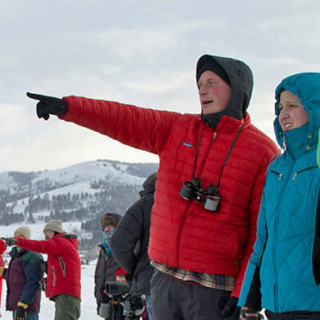Student Spotlight: Helen Russette
In this episode, hear from Helen Russette, a Ph.D. candidate within the School of Public and Community Health Sciences. Listen in as Helen talks about her dissertation which focuses on children with prenatal substance exposure and the benefits of early caregiver-child engagement and green space exposure.
Story Transcript
I was born and raised on the Rocky Boy’s reservation here in Montana. And I initially had an interest to come to the University of Montana when I attended this mental health careers opportunity program that the campus was hosting for high school students. And, I just fell in love with the community. I went to float the river and, you know, just doing all of that. It just seemed like a great place to go to college.
My name is Helen Russette, but my Native name is also wah-pe ki-hew-is-ko, which means White Eagle Woman in Cree. I am studying under the School of Public and Community Health Sciences.
I think the instrumental experience that I had that shaped my dissertation was when I first learned about an ongoing study that my advisor, Dr. Erin Semmens, was working on. And that was looking at children with prenatal substance exposure.
So, children with prenatal drug exposure have immediate maladaptive behaviors to the point where they are often, at a young age, difficult to soothe. They may become anxious or socially withdrawn. They may become more defiant, these angry outbursts, you know, just a lot of disruption that really affects them down the road. So, we are measuring early caregiver, child engagement and greenspace exposure as resilience factors that might be associated with social-emotional behavioral development among families with young children that have, and do not have prenatal substance exposure. So, in the summer of 2019, I worked with the family advocates with the Confederated Salish and Kootenai Tribes’ early childhood services to recruit and interview six families with a child with prenatal substance exposure.
All of the families like their faces lit up when they would talk about all of the activities they do with their children. Reading with the child singing, you know, just those positive stimulations. And then also, I'm also curious about green space, the natural environment, and that's very stimulating and that's actually been evidenced to be associated with just a plethora of beneficial health outcomes. And so, I wanted to measure both respectively.
I expect to see a greater gain for families with children with prenatal substance exposure that received all of those early interventions compared to that same population that did not receive a high amount of all those early exposures. I'm starting to finalize an academic paper now. I've already presented the results back to the community, to different leadership groups, to our community partner and I hope that this will be beneficial to the community where they can take and use this data, use these results to justify and apply for additional funding on their own. And I want them to be able to use it in a way that is meaningful. And then also, I want to share this with, with a wider audience.
I've been a, for the most part, a single mom, all of my academic career. Being a mother has made me want to work extra hard. I want the best life for my daughter. I want her to grow up in a world where – especially if she decides to have children down the road – that there is, these major shifts in the community that really promotes child wellbeing that really invest in the children where they're actually breaking cycles of trauma of substance misuse. And I feel like it starts at such a young age. And, why not start from the very get-go, from age zero.
